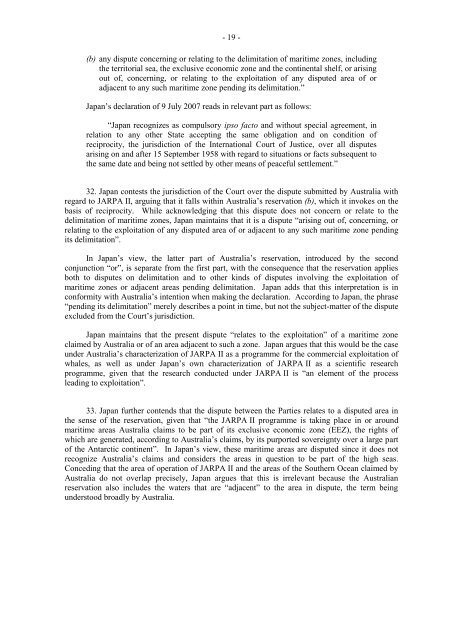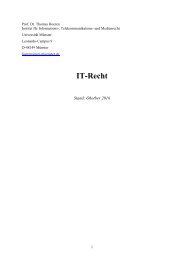3d4yVkKMl
3d4yVkKMl
3d4yVkKMl
You also want an ePaper? Increase the reach of your titles
YUMPU automatically turns print PDFs into web optimized ePapers that Google loves.
- 19 -<br />
(b) any dispute concerning or relating to the delimitation of maritime zones, including<br />
the territorial sea, the exclusive economic zone and the continental shelf, or arising<br />
out of, concerning, or relating to the exploitation of any disputed area of or<br />
adjacent to any such maritime zone pending its delimitation.”<br />
Japan’s declaration of 9 July 2007 reads in relevant part as follows:<br />
“Japan recognizes as compulsory ipso facto and without special agreement, in<br />
relation to any other State accepting the same obligation and on condition of<br />
reciprocity, the jurisdiction of the International Court of Justice, over all disputes<br />
arising on and after 15 September 1958 with regard to situations or facts subsequent to<br />
the same date and being not settled by other means of peaceful settlement.”<br />
32. Japan contests the jurisdiction of the Court over the dispute submitted by Australia with<br />
regard to JARPA II, arguing that it falls within Australia’s reservation (b), which it invokes on the<br />
basis of reciprocity. While acknowledging that this dispute does not concern or relate to the<br />
delimitation of maritime zones, Japan maintains that it is a dispute “arising out of, concerning, or<br />
relating to the exploitation of any disputed area of or adjacent to any such maritime zone pending<br />
its delimitation”.<br />
In Japan’s view, the latter part of Australia’s reservation, introduced by the second<br />
conjunction “or”, is separate from the first part, with the consequence that the reservation applies<br />
both to disputes on delimitation and to other kinds of disputes involving the exploitation of<br />
maritime zones or adjacent areas pending delimitation. Japan adds that this interpretation is in<br />
conformity with Australia’s intention when making the declaration. According to Japan, the phrase<br />
“pending its delimitation” merely describes a point in time, but not the subject-matter of the dispute<br />
excluded from the Court’s jurisdiction.<br />
Japan maintains that the present dispute “relates to the exploitation” of a maritime zone<br />
claimed by Australia or of an area adjacent to such a zone. Japan argues that this would be the case<br />
under Australia’s characterization of JARPA II as a programme for the commercial exploitation of<br />
whales, as well as under Japan’s own characterization of JARPA II as a scientific research<br />
programme, given that the research conducted under JARPA II is “an element of the process<br />
leading to exploitation”.<br />
33. Japan further contends that the dispute between the Parties relates to a disputed area in<br />
the sense of the reservation, given that “the JARPA II programme is taking place in or around<br />
maritime areas Australia claims to be part of its exclusive economic zone (EEZ), the rights of<br />
which are generated, according to Australia’s claims, by its purported sovereignty over a large part<br />
of the Antarctic continent”. In Japan’s view, these maritime areas are disputed since it does not<br />
recognize Australia’s claims and considers the areas in question to be part of the high seas.<br />
Conceding that the area of operation of JARPA II and the areas of the Southern Ocean claimed by<br />
Australia do not overlap precisely, Japan argues that this is irrelevant because the Australian<br />
reservation also includes the waters that are “adjacent” to the area in dispute, the term being<br />
understood broadly by Australia.



